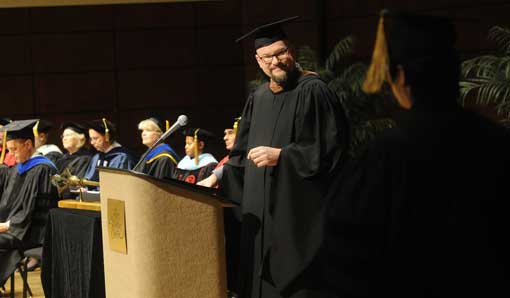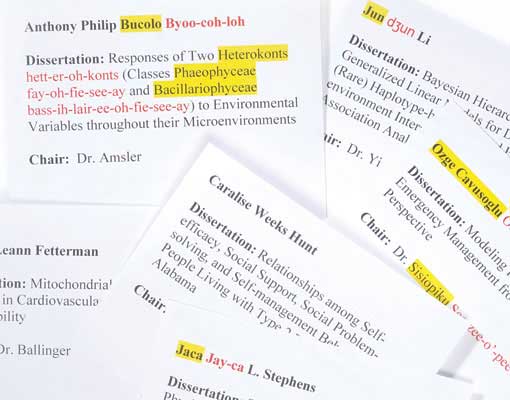Getting Them Right for Graduation
By Shannon Thomason
 In an auditorium full of doctors, Lee Shackleford often sounds like the smartest person in the room. The assistant professor in the Department of Theatre is responsible for announcing the names and dissertation titles for each graduate at each doctoral hooding ceremony at UAB.
In an auditorium full of doctors, Lee Shackleford often sounds like the smartest person in the room. The assistant professor in the Department of Theatre is responsible for announcing the names and dissertation titles for each graduate at each doctoral hooding ceremony at UAB.
At each semester’s end, proud graduates stride across the stage at UAB’s Alys Robinson Stephens Performing Arts Center to receive their doctoral honors. After countless hours of hard work and study, and with families and friends from far and wide in attendance, they’ve reached the crowning moment of their educational journey. So the last thing they want to hear is their name mispronounced.
Spring Commencement 2012UAB’s spring commencement ceremonies will take place at 9:30 a.m. and 2 p.m. on Saturday, May 12, 2012 in Bartow Arena, 617 13th St. South. Graduation for College of Arts and Sciences students, including those from the School of Education, will begin at 9:30 a.m. All other graduates will attend the 2 p.m. ceremony. Doors open at 8:30 a.m. for the 9:30 a.m. ceremony and at 1 p.m. for the 2 p.m. ceremony. The doctoral hooding ceremony will take place at noon Saturday, May 12, in the Jemison Concert Hall at UAB’s Alys Stephens Center, 1200 10th Ave. South. |
Lee Shackleford is responsible for making sure that never happens. An assistant professor in the UAB Department of Theatre, he is tasked with properly announcing each name and the often obscure words and symbols related to the dissertations at each doctoral hooding ceremony.
Shackleford always earns a hearty round of applause for his oratorical accomplishments, but he is quick to acknowledge that he doesn’t do the job alone. “Every semester, the folks at the UAB Graduate School, especially communications and events specialist Kellie Carter, work very hard to get phonetic pronunciations for the names of all candidates, who come from all over the world, and the terms in their dissertation titles,” Shackleford says. He then spends at least two weeks saying the names and titles aloud to practice for the big day.
“The greatest challenge is to remember what sound a Q or an X represents in different Far East languages,” Shackleford says. “For some, an X makes a ‘kh’ sound, and for others it’s ‘ch’ or ‘eks.’”
Story continues below

Scientific terms are often tricky, especially ones that differ according to discipline, Shackleford says. “Recently I had a word I felt sure I was pronouncing correctly because it seemed obvious phonetically, but after the ceremony, I learned that I had the emphasis wrong. But the experts who pointed out the mistake were very kind in mentioning that nobody outside of the materials-sciences world would know that.”
Shackleford has learned some tricks during his years in the job. He now brings to the ceremony an alphabetical list of the words he’s had the most trouble with in practice sessions, spelled out phonetically. “Usually when the moment comes, I can find them quickly on my list, but sometimes I have to rely on memory,” he says. ‘That’s why the week before the event, you’ll usually find me pacing the halls, muttering the names of chemical compounds and Chinese doctoral students.”
Shackleford takes the job quite seriously, because he knows how much that moment means to the students and their families. Parents and graduates have thanked him profusely for getting it right.
“I feel very strongly that on this day of all days, when the student’s parents often come from the other side of the planet to witness this event, the candidate should expect to have his or her name pronounced properly,” he says.